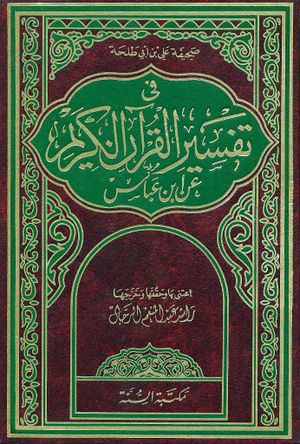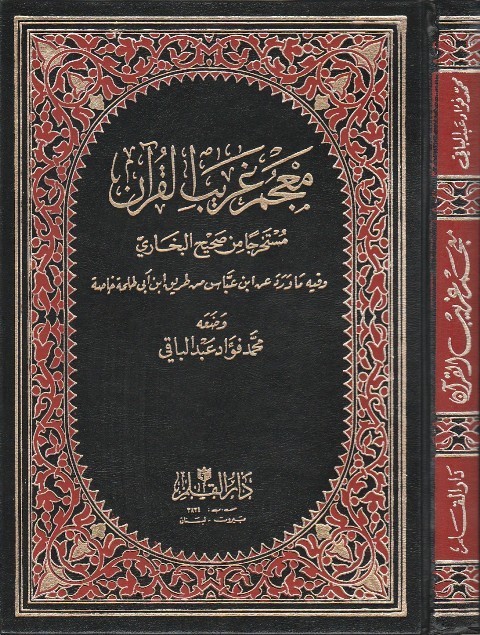Did Ibn ʿAbbās (d. 67/687) Write a Tafsīr?
Known as the Targum of the Qurʾan (ترجمان القران) and regarded highly in Muslim scholarship and historical memory, Ibn ʿAbbās (d. 67/687), the close companion of the Prophet Muḥammad, is said to have composed a tafsīr of the sacred Muslim scripture. But what do we know about this supposed work of exegesis (arguably the first attested attempt to explicate the Muslim revelation)?
Whether Ibn ʿAbbās committed his exegetical-lexical views to writing is difficult to say. If the sources are to be believed then there is little doubt that Ibn ʿAbbās was a learned reader of the Qurʾan who was intimately familiar with its linguistic and theological features. But writing is a loaded term especially in the context of the first century of Islam, that forever elusive period of formative history. A more probable scenario in my view is the argument that the students and later disciples of Ibn ʿAbbās did in fact compose an exegesis that invoked the authority of his views.
The possibility that these later exegetical remarks contain direct quotations of the historical Ibn ʿAbbās is less likely. More likely is that these later views ascribed to Ibn ʿAbbās were, to quote Herbert Berg, "tendentially shaped" exegetical formulations "by various factions seeking legitimacy in Islam's turbulent past shaped". In the later period these interpretive perspectives of the Qurʾa most likely coalesced into exegetical corpora forming the earliest layers of the medieval tafsīr literature and exegetical source materials.
Naturally, Ibn ʿAbbās occupied a role of central prominence as one of the principal progenitors and foundational figures of the tafsīr tradition that developed later. Interpretative readings of the Qurʾan that agreed with those of Ibn ʿAbbās were highly regarded and probative. Even better were those that were ascribed to him as direct expressions of his tafsīr.
Perhaps the earliest contender of the early exegetical corpora carrying views ascribed to Ibn ʿAbbās is the ṣaḥīfat ʿAlī b. Abī Ṭalḥah fī l-tafsīr (صحيفة علي بن أبي طلحة في التفسير) by ʿAlī b. Abī Ṭalḥah al-Hāshimī (d. 120/737).
In 1991 Rāshid ʿAbd al-Munʿim al-Rajjāl collated and edited the views of ʿAlī b. Ṭalḥah which were published in a single volume bearing the subtitle Ibn ʿAbbās Exegesis of the Noble Qurʾan (في تفسير القران الكريم عن ابن عباس).

The collected and published material occupied circa 500 pages. It is a reconstruction based on thirty or so medieval citations of the so-called tafsīr of Ibn ʿAbbās from the transmission of ʿAlī b. Abī Ṭalḥah. A number of later authorities claimed to have cited directly the tafsīr of Ibn ʿAbbās as transmitted by ʿAlī b. Abī Ṭalḥah. Among them were Bukhārī, Ṭabarī, and the Egyptian philologist and Qurʾan specialist Abī Jaʿfar al-Naḥḥās (d. 338/950).
It was al-Naḥḥās who narrates the famous praises of Aḥmad b. Ḥanbal:
بمصر صحيفة في التفسير رواها علي بن أبي طلحة ، لو رحل رجل فيها إلى مصر قاصدا ما كان كثيرا
[Translation: In Egypt there is a ṣaḥīfah of exegetical material transmitted by ʿAlī b. Abī Ṭalḥah. If a man were to travel to Egypt to seek (its content) that would not be much (i.e., a wasted journey).]
There is two takeaways from the laudatory sentiment of Ibn Ḥanbal: one, the tafsīr of Ibn ʿAbbās was somewhat popular, or widely known in the second-third/eight-ninth century. And two, copies and recensions of the work had travelled all the way to Egypt, and beyond Ḥimṣ in Syria, that is, where ʿAlī b. Abī Ṭalḥah lived before his death.
Despite the readiness of medieval authorities to accept the tafsīr of Ibn ʿAbbās (e.g., Bukhārī, Ibn Abī Ḥātim (who received it from Ibn Abī Ṣāliḥ kātib al-Layth), some ḥadīth critics cast aspersions on person of ʿAlī b. Abī Ṭalḥah, accusing him of weak transmission, for instance. One in particular accused him of harbouring Shiʿi views (وفيه تشيّع). That said, Bukhārī's reliance on the ʿAlī b. Abī Ṭalḥah corpus was confined to the genre of gharīb al-Qurʾān (غريب القران), or difficult lexical terms. The Bukhārī citations of ʿAlī b. Abī Ṭalḥah were collated and edited by Muḥammad Fuʾād ʿAbd al-Bāqī in 1950.

It is unlikely that ʿAlī b. Abī Ṭalḥā heard directly from Ibn ʿAbbās, leading some Muslim scholars to speculate about the identity of the intermediary sources. Mujāhid b. Jabr (died in Mecca in 102/720), the Successor most closely associated with the Qurʾan, is mentioned as the most likely intermediary between Ibn ʿAbbās and ʿAlī b. Abī Ṭalḥah. Al-Rajjāl, the editor of the صحيفة علي بن أبي طلحة في التفسير, repudiates medieval authorities critical of the route of transmission of ʿAlī b. Abī Ṭalḥah's corpus, who pointed out a supposed defect in one of the transmitters, namely Muʿāwiyah b. Ṣāliḥ.
Unsatisfied with the condemnatory nature of the medieval critics, al-Rajjāl turns to the famous Arabic editor and textualist Aḥmad Muḥammad Shākir (d. 1958), echoing the latter's repudiations of those who rejected the ʿAlī b. Abī Ṭalḥah corpus, accusing them of being motivated by sectarian bias against the supposed Shiʿi proclivities of ʿAlī b. Abī Ṭalḥah. This being so despite Shākir stating that ʿAlī b. Abī Ṭalḥā, while reliable in transmission, did not however hear directly from Ibn ʿAbbās.

In later times efforts were made by medieval Muslim exegetes and authorities to collect, collate, and lend some coherence to a plethora of exegetical statements and reports of Ibn ʿAbbās that qualify as exegesis in the later sense. Among them is the Tanwīr al-Miqbās min Tafsīr Ibn ʿAbbās, a commendable effort by the versatile Persian scholar and towering linguist of the late fourteenth-century Muḥammad b. Yaʿqūb al-Fīrūzābādī. The Tanwīr dispenses with detailed chains of transmission in the main text except when authorities and tradents are recounted in the prefaces of new chapters.



